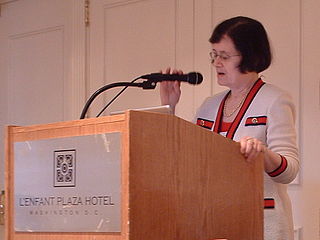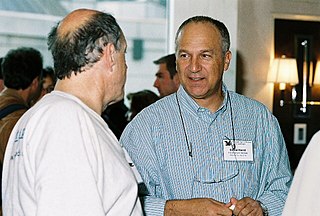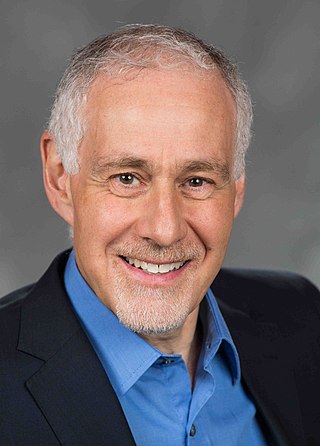
Barbara Bluestein Simons is an American computer scientist and the former president of the Association for Computing Machinery (ACM). She is a Ph.D. graduate of the University of California, Berkeley and spent her early career working as an IBM researcher. She is the founder and former co-chair of USACM, the ACM U.S. Public Policy Council. Her main areas of research are compiler optimization, scheduling theory and algorithm analysis and design.
In software engineering, profiling is a form of dynamic program analysis that measures, for example, the space (memory) or time complexity of a program, the usage of particular instructions, or the frequency and duration of function calls. Most commonly, profiling information serves to aid program optimization, and more specifically, performance engineering.
Brent Hailpern is a computer scientist retired from IBM Research. His research work focused on programming languages, software engineering, and concurrency.
The ACM SIGPLAN International Conference on Functional Programming (ICFP) is an annual academic conference in the field of computer science sponsored by the ACM SIGPLAN, in association with IFIP Working Group 2.8. The conference focuses on functional programming and related areas of programming languages, logic, compilers and software development.

David Harel is a computer scientist, currently serving as President of the Israel Academy of Sciences and Humanities. He has been on the faculty of the Weizmann Institute of Science in Israel since 1980, and holds the William Sussman Professorial Chair of Mathematics. Born in London, England, he was Dean of the Faculty of Mathematics and Computer Science at the institute for seven years.
Monica Sin-Ling Lam is an American computer scientist. She is a professor in the Computer Science Department at Stanford University.

Zvi Galil is an Israeli-American computer scientist and mathematician. Galil served as the President of Tel Aviv University from 2007 through 2009. From 2010 to 2019, he was the dean of the Georgia Institute of Technology College of Computing. His research interests include the design and analysis of algorithms, computational complexity and cryptography. He has been credited with coining the terms stringology and sparsification. He has published over 200 scientific papers and is listed as an ISI highly cited researcher.
In program analysis, shape analysis is a static code analysis technique that discovers and verifies properties of linked, dynamically allocated data structures in computer programs. It is typically used at compile time to find software bugs or to verify high-level correctness properties of programs. In Java programs, it can be used to ensure that a sort method correctly sorts a list. For C programs, it might look for places where a block of memory is not properly freed.
Elaine Jessica Weyuker is an ACM Fellow, an IEEE Fellow, and an AT&T Fellow at Bell Labs for research in software metrics and testing as well as elected to the National Academy of Engineering. She is the author of over 130 papers in journals and refereed conference proceedings.
GrammaTech is a software-development tools vendor based in Bethesda, Maryland with a research center based in Ithaca, New York. The company was founded in 1988 as a technology spin-off of Cornell University. GrammaTech is a provider of application security testing products and software research services.

Reinhard Wilhelm is a German computer scientist.
Pierre Genevès is a French computer scientist born in 1980. He is research scientist at CNRS and recipient of the 2013 CNRS Bronze medal.
Thomas W. Reps is an American computer scientist known for his contributions to automatic program analysis. Dr. Reps is Professor of Computer Science in the Computer Sciences Department of the University of Wisconsin–Madison, which he joined in 1985. Reps is the author or co-author of four books and more than one hundred seventy-five papers describing his research. His work has covered a wide variety of topics, including program slicing, data-flow analysis, pointer analysis, model checking, computer security, instrumentation, language-based program-development environments, the use of program profiling in software testing, software renovation, incremental algorithms, and attribute grammars.
Susan Beth Horwitz was an American computer scientist noted for her research on programming languages and software engineering, and in particular on program slicing and dataflow-analysis. She had several best paper and an impact paper award mentioned below under awards.

Alexander L. Wolf is a Computer Scientist known for his research in software engineering, distributed systems, and computer networking. He is credited, along with his many collaborators, with introducing the modern study of software architecture, content-based publish/subscribe messaging, content-based networking, automated process discovery, and the software deployment lifecycle. Wolf's 1985 Ph.D. dissertation developed language features for expressing a module's import/export specifications and the notion of multiple interfaces for a type, both of which are now common in modern computer programming languages.

Kathleen Shanahan Fisher is an American computer scientist who specializes in programming languages and their implementation.
Helmut Veith was an Austrian computer scientist who worked on the areas of computer-aided verification, software engineering, computer security, and logic in computer science. He was a Professor of Informatics at the Vienna University of Technology, Austria.

Grigore Roșu is a computer science professor at the University of Illinois at Urbana-Champaign and a researcher in the Information Trust Institute. He is known for his contributions in runtime verification, the K framework, matching logic, and automated coinduction.
Martin Vechev is a professor at the Department of Computer Science at ETH Zurich working in the fields of programming languages, machine learning, and security. He leads the Secure, Reliable, and Intelligent Systems Lab (SRI), part of the Department of Computer Science. He is known for his pioneering works in machine learning for code (BigCode), where he introduced statistical programming engines trained on large codebases, reliable and trustworthy artificial intelligence, where he introduced abstract interpretation methods for reasoning about deep neural networks to enable the verification of large machine learning models, and quantum programming, introducing the first high-level programming language and system Silq.







